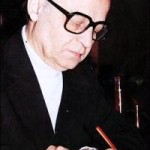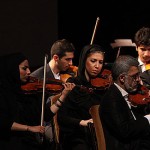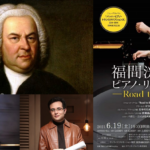Payam Taghadossi (born in 1989) started his musical education at the age of 4 years with Monika Scherbaum in Bregenz (Austria). At the Conservatory Feldkirch he joined the class of Imke Frank and Martin Merker. Later he studied in Zurich (Switzerland) with Thomas Grossenbacher and Christian Proske, where he 2011 graduated as a Bachelor of Arts in Music Performance. Two years later as the student of Rafael Rosenfeld he received his Master of Arts in Music Performance diploma and later graduated as a Master of Arts in spezialized Music Performance in 2016 from the Hochschule für Musik Basel FHNW.
Tag Archives: cello
Latest posts
- Transition to Enlightenment: Six Lectures on Mozart’s String Quartets (5)
- Nasser Masoudi: The Voice of Gilan and a Legacy of Iranian Music
- Farhad Poupel: The Voice of the Shahnameh in the Orchestras Around the World
- Five Major Myths About Mozart’s Life
- Bahma Rajabi Passed Away!
- Reza Vohdani; Unveiling unpublished works, preservation of Iranian classical music
- Ahmad Pejman Passed Away!
- Timeless or Timely: The Role of Historical Context in Defining Artistic Value
- Leading the Charge in Censorship
- The Legacy of Khosrow Jafarzadeh
- Transition to Enlightenment: Six Lectures on Mozart’s String Quartets (4)
- Fereydoun Shahbazian, An Iranian Musical Icon Passed Away
From Past Days…

Hossein Dehlavi: the Composer
With Dehlavi it is not all about fame but recognition. Hossein Dehlavi is not a popular musician (like pop singers) whom everybody might know when he is walking on streets of Tehran; however, he is recognized by both amateur and distinguished musicians of the country.

Interview with Farhad Poupel (I)
Born in Isfahan, Iran, and based in the UK, Farhad Poupel’s music has been performed and will be performed in numerous prestigious concert halls and festivals throughout the world including Suntory Hall in Tokyo, Japan; La Roque-d’Anthéron Piano Festival, La Roque-d’Anthéron, France; Biarritz Festival, Biarritz, France; Stoller Hall, Manchester, UK; Janacek academy of music and performing art, Brno, Czech Republic; Karlskrona International Piano Festival, Karlskrona, Sweden; by distinguished artists such as Kotaro Fukuma, Peter Jablonski, Daniel Grimwood, Margaret Fingerhut, Catherine Carby, Kristýna Znamenáčková,Jeffrey Biegel, Jean-Francois Bouvery and orchestras such as Windsor Symphony Orchestra or broadcasted on the NPR Radio 4, Netherland. The following is an interview with him on the ocaasion of the premier of the Legend of Bijan and Manijeh.

Banan: the Artist of the Age
Gholam Hossein Banan was born in 1911 in Tehran. He was born in an affluent art-loving family who were Naser al-Din Shah Qajar (1848-1896)’s relative. The Qajar King was his mother’s uncle on her father’s side. He learnt his first lessons in music while his father sang Iranian avaz (improvised rhythmic-free singing), he then attended classes by the renowned Iranian composer, Morteza Neydavoud (1900-1990) along with his sisters; the composer is, therefore, considered as his first teacher. He then learnt Iranian avaz under the supervision of Mirza Taher Zia Resaee (Zia-o Zakerin) and Naser Seif in an oral manner.

Maestro Hassan Nahid’s Role in Promoting the Ney
Maestro Hassan Nahid is one of the most prominent and distinctive artists who values high morals, discipline and hard work. His music activities include playing the Ney as both soloist and an accompaniment in the most important Iranian music orchestras and ensembles during the last fifty years, including the Orchestra of Iranian Instruments (Nusratullah Golpayegani), the Orchestra of National Instrumentalists of the Ministry of Culture and Arts (Payvar Orchestra), the Orchestra of Iranian Instruments (Morteza Hananeh) , Darvish Orchestra, Samaie Orchestra, Roudaki Orchestra, Maestros’ Ensemble, Aref Ensemble, as well as performances in various radio programs, many concerts in different countries, as well as a long teaching experience in the National Conservatory of Music, music universities and other music institutions to name but a few.

Principles of Violin Playing (IX)
4.3.1. To practice playing of doubles of notes involving two different fingers, each note is played at separate bows with slow tempo, each note is played perfectly regarding its bass and tenor sounds and then the considered double is played at another bow while considering the resulted sound of the double.

Women Musicians in Large Iranian Orchestras
It is more than a century now that the sociologists consider the presence of women in different social domains as a benchmark for a society’s progress. They analyze the presence of women in society by the means of available statistics. Unfortunately, as with regard to the Iranian society, statistics related to women’s engagement, has not been available to the researchers, if they existed at all.

A note on “Illusion or Ingenuity” article
The author of the “Illusion or Ingenuity” article, who is apprehensive of the future of the Music in Iran, enumerates some symptoms of the music weakening in the country for example decreasing in the quality of the music as well as lack of the innovation in creating them, a gradual decline in the music public taste and the drop in the application of layered sound and polyphony in music. He explains that one reason for this gradual weakening might be our unawareness of the fact that we are not so intelligent nation. He believes that we, Iranians, have a comprehensive “Illusion of the high national intelligence “that make us ignorant of the unfavorable realities of our music and consequently no searching for the remedy is taking place. His point of view brings to the mind a patient who thinks he is healthy, therefore delays the treatment and finally is killed by the disease. The author also refers to the national difficulties which gradually will lower the national intelligence score such as the increased rate of the immigration and brain drain, low quality of the nutrition, incompetence of the education system and etc and predicts that the condition of the music of Iran might deteriorate in the future because of the mentioned illusion of its great status.

Farhad Poupel’s piece, Road to Bach, performed at Suntory Hall
On June 19, 2021 , young Iranian composer and pianist, Farhad Poupel’s piece, Road to Bach, was performed at the prestigious Suntory Hall by the great Japanese pianist, Kotaro Fukuma. The piece was commissioned by Kotaro Fukuma to have its world premiere in Suntory Hall during a concert by the same name.

Principles of Playing Violin (IV)
Pattern No.3/1 Left hand finger Placement: 3/1/1: Landing Fingers on one String: In preliminary stages of training, an apprentice should pay attention to the principle of keeping fingers while placing them on the fingerboard. Professional violinists pay less attention to this principle. Novice player’s complying with this principle, in preliminary stages of training, has several…
Read More
Transition to Enlightenment: Six Lectures on Mozart’s String Quartets (1)
Transition to Enlightenment: Six Lectures on Mozart’s String Quartets* Basic Ideas and General Structure The Enlightenment, an epoch of intellectual fervor marked by reason, individualism, and cultural evolution, indelibly left its imprint on the arts. Mozart, a luminary of this transformative era, intricately wove these ideals into his compositions, particularly his string quartets. This article…
Read More